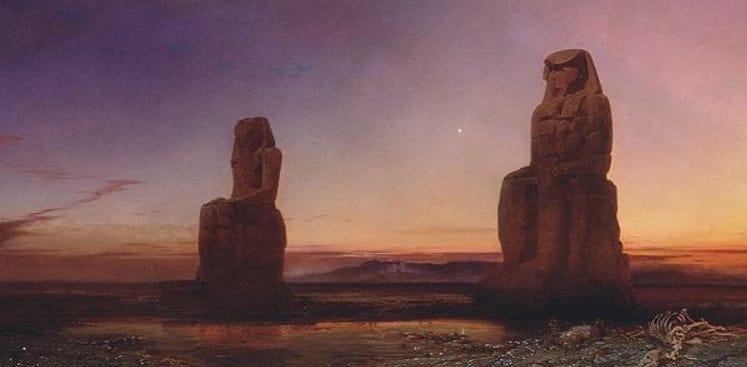The Word-Hoard: Clark Ashton Smith
90+ iridescent words from weird fiction's densest, strangest writer
The list below is based off a little bookmark that I kept while reading Penguin Classics’ collection of selected works by Clark Ashton Smith. I jotted down each new or eye-catching word I found, and by the end I had several dense columns of miniscule writing to look up.
Clark Ashton Smith was a weird fiction writer and poet of the 30s, a multitalented storyteller-artist-sculptor-craftsman from northern California. Initially acclaimed as a local poet and wunderkind, his fantastic poetry and stories eventually found success in Weird Tales and other pulp magazines. Mostly an autodidact, Smith lived with his family in an out-of-the-way cabin and did not pursue more than a middle school education. Instead, he drew from inspirations — Baudelaire, Poe — and resources at hand — the Oxford Dictionary, the Encyclopedia Britannica — to create his trademark maximalist style. His work attracted the attention of a fellow “obscure companion in the realms of the macabre,” H.P. Lovecraft, and the two maintained a spirited correspondence until Lovecraft’s death. (Smith sent Lovecraft a carved dinosaur bone.)1 Robert E. Howard likewise thought that Smith was excellent, and wrote Smith that he would sacrifice a finger “for the ability to make words flame and burn as you do.”


Smith’s writing had transformative effects on both peers and admirers; in 1949, a teenage Harlan Ellison was inspired to steal an anthology from a library after encountering Smith’s story, “The City of the Singing Flame,” inside. Ray Bradbury was also inspired by “City,” and said the story and its artwork “permanently touched and changed and excited [his] life.” Smith’s own philosophy toward writing seemed to demand nothing less of himself:
To me, the best, if not the only function of imaginative writing, is to lead the human imagination outward, to take it into the vast external cosmos [and away from individual preoccupations].
Unlike his peers Lovecraft and Howard, Smith’s work is marked less by an overarching mythos or recurring figures (though he had several) than by an unmistakable stylistic richness. His prose is dense, extravagant. The action slows, sometimes for pages, while Smith leads us through heaps of ruined architecture, galleries of jewels, multicolored mountains, worlds of triple suns. Smith selects his words like an archeologist at a dig site: clearing away the dust and sand to find radiant objects and hold them out.
On the dun, wet sands, beyond the foamy tongues of the surf, would lie the curious driftage of alien shores, and trove that hurricanes had cast up from unsounded deeps. And there we had found the purple and sanguine valutes of great shells, and rude lamps of ambergris, and white flowers of perpetually blooming coral; and once, the barbaric idol of green brass that had been the figurehead of a galley from far hyperboreal isles. (“The Double Shadow”)
Smith’s vocabulary is so vast that I found another, more expansive glossary over at Eldritch Dark (the definitive online compendium of his writings and supplementary materials), only to discover it had very little overlap with my own.
The demand Smith’s prose makes on a reader is its biggest reward and its biggest hurdle. Allegedly, Isaac Asimov hated Smith’s verbosity (though I can’t find a definitive source for this). And an incoming owner of Weird Tales threw some thinly-veiled darts at Smith in 1938, complaining of stories that were too “French” or “Latin” in their verbiage and required an “unabridged dictionary” to read.
Obviously the readers of the orb are no such philistines, and can appreciate Smith’s ambitious style for what it was: a way to realize the fullness of worlds far beyond our own in darkness and in splendor.
Orb Recs
“The City of the Singing Flame”
Read aloud by Harlan Ellison for “Hour 25” on KFPK Southern California
“Nyctalops” (poem)
Definitions from the OED.
Actuate: to cause to move mechanically, to animate — “you are aware of the baneful influences… which so often actuate or influence us” (“The Devotee of Evil”)
Adumbration: a shadowing, a shade, a murky outline
Alienage: the state of being a stranger
Amarant: variant of “amaranth.” In poetry, an unfading flower.
Amethystine: resembling amethyst
Anaglyph: an embossed symbol or motif, done in low relief
Anarch: (adj) anarchic
Antemundane: preceding the creation of the world
Bizzarerie: bizzareness — “I felt only a wild desire to escape from the the maddeningly oppressive bizzarerie of this region and regain my own world” (“The City of the Singing Flame”
Boscage: a mass of trees or shrubs
Burdenous: burdensome
Candent: glowing with a white heat
Cinerary: relating to ashes, specifically funereal ashes or items devoted to holding funereal ashes
Clepsydra: a water clock
Coign (quoin): a wedge, a cornerstone, or a raised piece of land. Or, as a verb, to lift/wedge something
Collosean: collosal
Concameration: a connected series of chambers
Coronal: relating to the sun’s corona, or glowing in resemblance of the sun’s corona
Crotali: from crotalum, a sistrum or clapper used in ancient Greek music — “crotali made from the bones and teeth of the cockadrill” (“The Last Incantation”)
Culminant: describes a heavenly body at its peak meridian
Deadfall: a mass of trees brought down by a storm
Demesne: a domain — “some lost demesne/Of the pagan dead, vaulted with perfume and with fire” (“To George Sterling: A Valediction”)
Demonian: variant of “demonic” —“the balas-rubies of his rings…burned like demonian eyes” (“The Last Incantation)
Disincarnate: unbodied, as of a soul
Dolent: variant of “dolorous”
Drear: dreary. — “Now he must go back to the drear existence of a medieval monk” (“The Holiness of Azederac)
Driftage: wreckage, drifted flotsam
Drouth: dryness, drought
Dynast: hereditary ruler in power, especially the founder of a dynasty
Eft: a little newt or water lizard
Embrue: to stain, immerse, usually with blood
Emmet: ant (archaic) — “far below… men and camels fled like scurrying emmets but could not escape” (“The Dark Eidolon”)
Empery: the position of emperor
Eremite (as an adjective): hidden, like a hermit
Erodent: eroding, corrosive (used of medicines)
Erubescence: rubescence
Evocator: a spirit-conjurer
Fulvious: variant of “fulvous.” Red/yellow
Goety: witchcraft, necromancy (as in the Ars Goetia)
Horrent: bristling, as with hairs stood up
Hydromel: a honey liquor similar to mead
Immanifest: not present
Immarcescible: unfading, uncorruptible. The opposite of “marcescible.” Comes from the same Greek roots as “amaranthine” (a-marant-os).
Impendant: hanging over, like cliffs (form of “impending”)
Innominable: not able to be named, too forbidden to be named. — “the noisome and furtive passing of innominable things” (“The Holiness of Azederac”)
Irrespirable: suffocating, not fit to be breathed
Lair (Verb): to abide in a place, make a lair there
Lar: the house-gods of ancient Rome — “Goddess and Gorgon, Lar and faun” (“Song of the Necromancer”)
Lave: to wash (lavare) — “the blossoms… were leaning about his waist, were laving his hips and thights in their thin, evil slaver” (“The Maze of the Enchanter”)
Lentor: slowness, a thickness of the blood
Lethiferous: deadly (a variant of “lethal”)
Levin: brightness, a flash of lightning or flame
Litten: a form of “lit.” “Litten windows,” “litten caves,” etc. — “Blue-litten by the vast and vagrant wave” (“Anterior Forms”)
Marge: the edge or bank of a body of water — “the stream Zemander, by whose ever-verdant marge he had walked at eventide with Nylissa” (“The Last Incantation”)
Martichora: a manticore
Massy: massive
Miasmata: miasma
Milch: used for milk. Milch goat, milch cow
Miry: swampy, like a mire
Moly: an herb used by Odysseus against Circe’s enchantment, refers to a number of plants
Mortise: to fasten — “the wizard-mortised tower upbuilds its wall” (“Cycles”)
Necromant: necromancer
Nemoral: relating to groves or woods
Nome: a district in ancient Egypt — “the crumbling nome/where the fell sphinx and martichoras roam” (“Outlanders”)
Nyctalops: one who sees better at night
Octireme: ancient boat with eight rowers per row
Ophidian: relating to snakes (Ophidia)
Paven: paved
Petrific: petrified
Philterous: like a love potion — “the wine had filled his blood with a philterous ardor” (“Mother of Toads”)
Plenilune: the full moon
Poddy: a type of mullet fish
Precipitancy: haste — “I sank with the hopeless precipitancy of the damned” (“The Devotee of Evil”
Ramified: forming branches, offshoots
Rutilance: a red glow, rubescence
Saltant: dancing
Sanies: a watery fluid or pus from the body
Scrine: a chest or coffer for relics
Simulachre: an image of a god that is offered worship
Stridulation: the grating, vibrating noise made by insects like cicadas
Submundane: hellish, under-worldly
Subornless: without coercion/unable to be made to commit an act
Syenite: a type of crystalline rock with feldspar in it
Tenebrific: producing darkness
Terebinth: a type of resin tree from the Mediterranean — “they lit three torches of pitchy terebinth” (“The Weaver in the Vault”)
Terrifical: terrifying
Trinal: triune
Troublous: troublesome
Unlegended: untold-of, forgotten, unknown. — “…the domeless, three-angled towers and broken-down monoliths were those of some unlegended city” (“The Vaults of Yoh-Vombis”)
Vicinal: neighboring, adjacent
Venefic: venomous — “some venefic bloom in darkness grown” (“The Hashish-Eater”)
Verge: the border of a region or town
Wilder: to lead astray, confuse (bewilder) — “a strange fever sang in his ears and wildered his senses” (“Xeethra”)
February 1930, HPL: “And now let me thank you most profoundly & eloquently in advance for those bits of dinosaur bone which you mention as being tentatively en route! Nothing could be more appropriate to my tastes or more stimulative to my fancy! To think of having by me the mortal remains—in part—of a twenty-foot-high thing which lumbered about the primal Pacific morasses 50,000,000 years ago .... a thing which may have trod the vari-colour’d sands of Lemuria, & nosed amongst the fallen obelisks of the Elder Ones.....a beast on whose broad back Great Cthulhu himself may have ridden from his palace in blasphemous R’Iyeh!”










Thanks; this made me smile. I assume you're familiar with Smith's poetry? If not, check out 'The Hashish-Eater".
I am challenging myself to find forty excuses to use forty of these words in the next year.